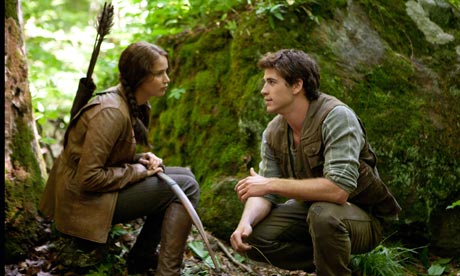
Our reader reviewers are a clued-up lot, so inevitably they've been debating the hot series of the moment, The Hunger Games. One of the most interesting reviews this week was from brintmurray, who considerately put a spoiler alert on a nicely nuanced analysis.
brintmurray admits to having spent some time coming to an opinion about the third volume in the saga, Mockingjay. At first, s/he had doubts about the introduction of a whole new underground sector, with a developed technology and its own resistance movement already set up and in place.
But I've since reconsidered: in the real world, how many rebel movements do take on an entrenched government without the assistance of some other agency – usually a foreign power – to provide weapons and support? So maybe, in that respect, it is actually more realistic than the rebels simply being able to rise up, untrained and virtually unarmed, and take on the sophisticated weaponry of the Capitol.
The demands of gripping a Young Adult readership meant that there was some simplification of the concept of institutional power structures, but brintmurray felt the characterisaton had deepened and the pacing was just as brisk.
Reviewing the same volume for our children's and teens site, pinkbookworm showed that younger reviewers can be just as sceptical as older ones:
I'll have to admit, my Hunger Games experience was a bit of a rollercoaster. There were times where everything made sense; there were times when I was blank, and completely clueless. And there were times when I understood exactly why the Hunger Games was a bestseller.
She felt that Mockingjay marked a return to form after her disappointment with the second in the series, Catching Fire.
Back on the adult site, however, LakerFan felt that Catching Fire was the best of the three, "despite popular notions to the contrary".
It is a battle of mind and propaganda as much as it is an armed rebellion and betrayal. The Machiavellian manipulations are not as unsophisticated as would be expected for a work in this genre.
frustratedartist, meanwhile, has been working his way through a rather older series – Zola's "Rougon Macquart" novels, which depict aspects of French contemporary life, from the mines, in Germinal, to the railways, in La Bete Humaine. But, daunted by the political heft of His Excellency Eugene Rougon, he decided to take a detour into one of Zola's lesser known novels, The Dream. What he found surprised him:
The Dream is quite different. Yes, the setting is vividly described – a small Cathedral town not far from Paris, but there's not much hint of the modern age and there are much fewer characters than in most of his other novels. It is intimate and timeless in nature – the main action could have taken place almost any time since the middle ages.
He wondered whether the unexpected departure was a reaction to critical hostility. "It is … almost as if, faced with the criticism of some of his earlier novels as 'anti-Catholic' he set himself to write a 'Catholic' novel by way of balance. The result is absolutely charming."
Do drop me a line on claire.armitstead@theguardian.com if I've mentioned your review, and I'll dig you out something excellent from our cupboards. Thanks again for all your reviews – see you next week.

